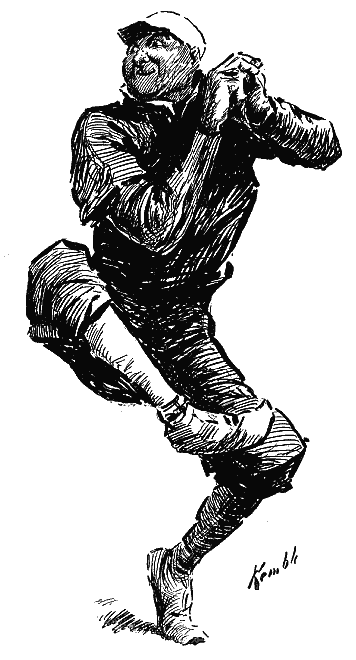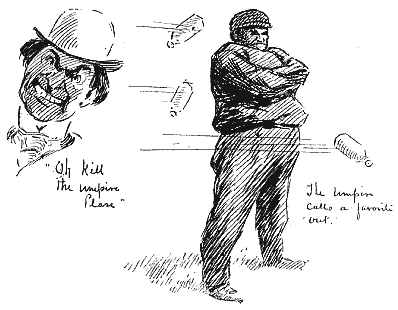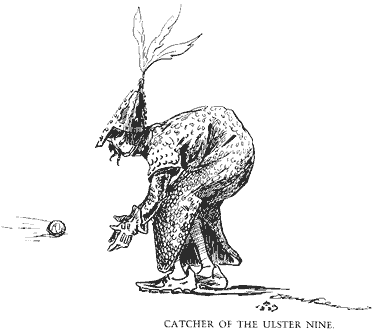From
the Boston Daily Globe, April 9, 1889, p. 1
Though
not a native, as intimated by the chairman, I have visited, a great
many years ago, the Sandwich Islands-that peaceful land, that beautiful
land, that far-off home of profound repose, and soft indolence, and
dreamy solitude, where life is one long slumbrous Sabbath, the climate
one long delicious summer day, and the good that die experience no
change, for they but fall asleep in one heaven and wake up in another.
And
these boys have played base ball there! Base ball, which is the very
symbol, the outward and visible expression of the drive, and push,
and rush and struggle of the raging, tearing, booming nineteenth century!
One cannot realize it, the place and the fact are so incongruous;
it's like interrupting a funeral with a circus. Why, there's no legitimate
point of contact, no possible kinship, between base ball and the Sandwich
Islands; base ball is all fact, the Islands all sentiment. In base
ball you've got to do everything just right, or you don't get there;
in the islands you've got to do everything just wrong, or you can't
stay there. You do it wrong to get it right, for if do it you right
you get it wrong. There isn't a way to get it right, but to do it
wrong, and the wronger you do it the righter it is. The natives illustrate
this every day. They never mount a horse from the larboard side, they
always mount him from the starboard; on the other hand, they never
milk a cow on the starboard side, they always milk her on the larboard;
it's why you see so many short people there--they've got their heads
kicked off. When they meet on the road, they don't turn out to the
right, they turn out to the left.
And
so, from always doing everything wrong end first, that way, it makes
them left-handed-left-handed and cross-eyed. They are all so. When
a child is born, the mother goes right along with her ordinary work,
without losing half a day--it's the father that knocks off and goes
to bed till he gets over the circumstances. And those natives don't
trace descent through the male line, but through the female. They
say they always know who a child's mother was. Well, that odd system
is well enough there, because there a woman often has as many as six
or seven husbands, all at the same time--and all properly married
to her, and no blemish about the matter anywhere. Yet there is no
fussing, no trouble. When a child is born the husbands all meet together
in convention, in a perfectly orderly way, and elect the father, and
the whole thing is perfectly fair; at least as fair as it would be
anywhere. Of course you can't keep politics out; you couldn't do that
in any country, and so, if three of the husbands are Republicans and
four are Democrats, it don't make any difference how strong a Republican
aspect the baby has got, that election is going Democratic every time.
And in the matter of that election those poor people stand at the
proud altitude of the very highest Christian civilization; for they
know, as well as we, that all women are ignorant, and so they don't
allow that mother to vote.
In
those Islands the cats haven't any tails, and the snakes haven't any
teeth; and what is still more irregular, the man that loses the game
gets the pot. And as to dress: the native women all wear a single
garment--but the men don't. No, the men don't wear anything at all.
They hate display; when they even wear a smile they think they are
overdressed. Speaking of birds, the only bird there that has ornament
feathers has only two--just barely enough to squeeze through with--and
they are under its wings instead of on top of its head, where of course
they ought to be to do any good. The native language is soft, and
liquid and flexible, and in every way efficient and satisfactory--till
you get mad; then, there you are; there isn't anything in it to swear
with. Good judges all say it is the best Sunday language there is;
but then all the other six days in the week it just hangs idle on
your hands; it isn't any good for business; and you can't work a telephone
with it. Many a time the attention missionaries has been called to
this defect, and they are always promising they are going to fix it;
but no, they go fooling along and along, and nothing is done.
Speaking
of education, everybody there is educated there, from the highest
to the lowest; in fact, it is the only country in the world where
education is actually universal, and yet every now and then you run
across instances of ignorance that are simply revolting-simply degrading
to the human race. Think of it--there, the ten takes the ace, but
let us not dwell on such things; they make a person ashamed.
Well,
the missionaries are always going to fix that, but they put it off,
it off, and put it off, and so the nation is going to keep on going
down and down and down till some day you will see a pair of jacks
take a straight flush.
Well,
it is refreshment to the jaded, water to the thirsty, to look upon
men who have so lately breathed the soft airs of those islands of
the blest and had before their eyes the inextinguishable vision of
their beauty. No alien land in all the world has any deep, strong
charm for me but that one, no other land could so longingly and so
beseechingly me, sleeping and waking, through half a lifetime, as
that one has done. Other things leave me, but it abides; other things
change, but it remains the same. For me its balmy airs are always
blowing, its summer seas flashing in the sun, the pulsing of its surfbeat
is in my car; I can see its garlanded crags, its leaping cascades,
its plumy palms drowsing by the shore, its remote summits floating
like islands above the cloud rack; I can see the spirit of its woodland
solitudes; I can hear the plash of its brooks, and in my nostrils
still lives the breath of flowers that perished 20 years ago.
And
these world-wanderers have lately looked upon these things!--and with
eyes of flesh, not the unsatisfying vision of the spirit. I envy them
that! Yes, and I would envy them somewhat of the glories they achieved
in their illustrious march about the mighty circumference of the earth
if it were fair; but no, it was an earned run, and envy he out of
place. I will rather applaud-add my welcome to the vast shout now
going up, from Maine to the Gulf, from the Florida keys to frozen
Alaska, out of the throats of the other 65,000,000 of their countrymen.
They have carried the American name to uttermost parts of the earth--and
covered it with glory everywhere.
That
is a service to sentiment; but they did the general world a practical
service--a service to the great science of geography. Ah! think of
that! We don't talk enough about that--don't give it its value. Why,
when these boys started out you couldn't see the equator at all; you
could walk right over it and never know it was there. That is the
kind of equator it was. Such an equator as that isn't any use to anybody;
as for me, I would rather not have any equator at all than a dim thing
like that, that you can't see. But that is all fixed now; you can
see it now; you can't run over it now and not know it's there. And
so I drink long life to the boys who ploughed a new equator round
the globe, stealing bases on their bellies!





